Our Clients
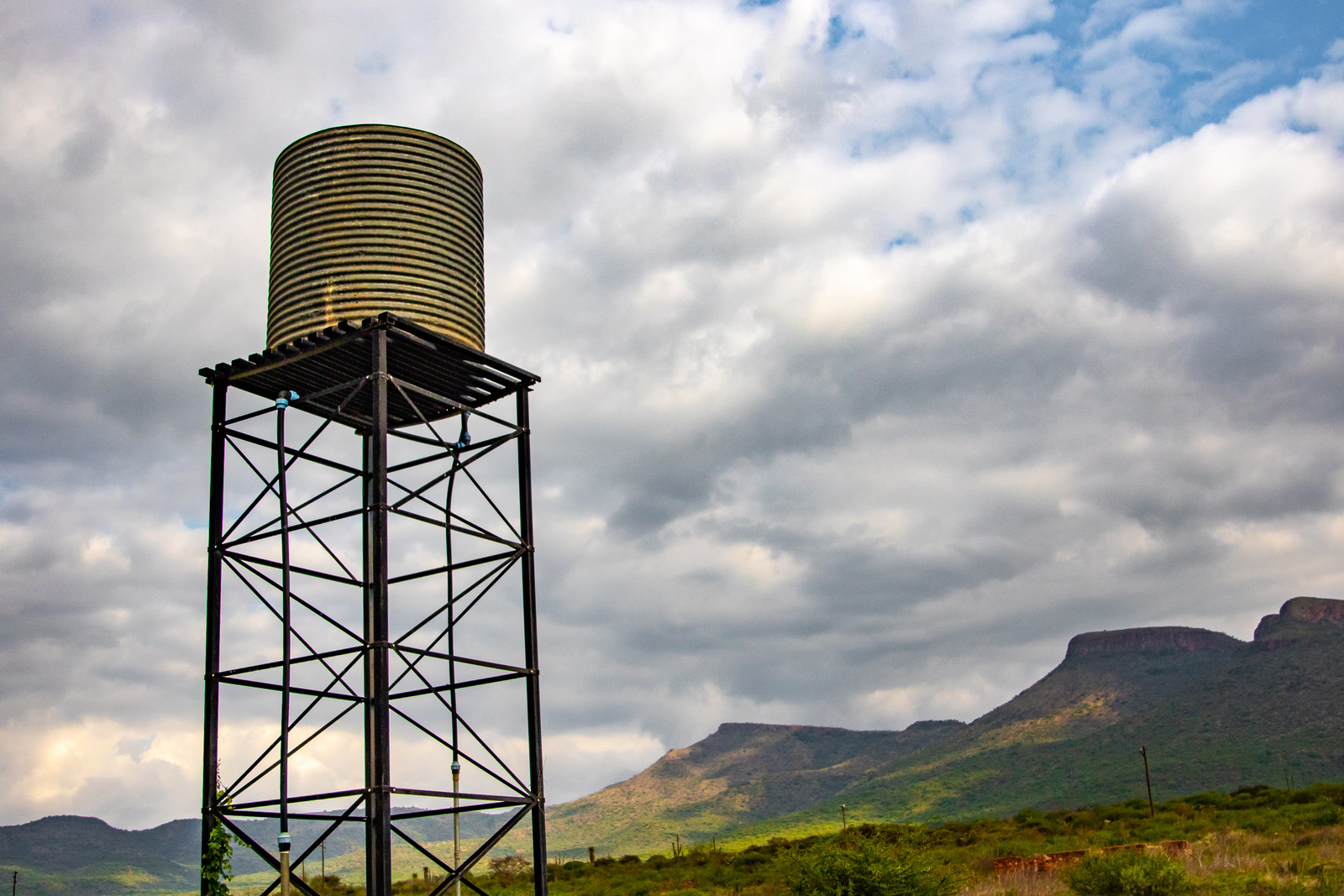
Why Choose Steel Rainwater Tanks in Foster?
When it comes to water storage in Foster, the choice of tank material matters. While various options are available, steel tanks stand out for their superior durability and safety, addressing the core concerns of Foster residents.
- Unmatched Durability: Steel tanks are built to last. They withstand harsh weather conditions, resist corrosion, and provide a long-term solution to your water storage needs in Foster.
- Enhanced Bushfire Safety: In areas prone to bushfires, like parts of Foster, safety is paramount. Steel tanks are fire-resistant, offering a safe and reliable water source for firefighting and property protection. This is a critical advantage over plastic tanks, which can melt and exacerbate fire risks.
- Reliability You Can Depend On: Inconsistent water supply can disrupt daily life. Steel rainwater tanks in Foster provide a dependable backup, ensuring you have water when you need it most.
Finding the Right Rainwater Tank in Foster
Choosing the right rainwater tank in Foster involves considering several factors.
- Size and Capacity: The size of your tank depends on your water usage and property size. Whether you need a slimline tank for a compact space or a large round tank for maximum storage, Cessnock Tank Works offers a variety of options in Foster.
- Type of Tank:
- Round Tanks: These are a popular choice for their durability and capacity.
- Slimline Tanks: Ideal for properties in Foster, where space is limited, offering a compact yet efficient water storage solution.

Explore the Different Types of Water Tanks
Choosing the right water tank material is essential for long-lasting performance and reliability. Here’s an overview of the most common materials, along with their advantages and disadvantages:
PVC Tanks
Pros: Affordable, strong, lightweight, and corrosion-resistant.
Cons: Brittle in cold weather, may leach chemicals if not food-grade, and potentially contains carcinogens.
PVC tanks are cost-effective and resistant to UV light, making them suitable for moderate climates. However, they can crack over time and are best used with food-grade PVC for safe water storage.
Fibreglass Tanks
Pros: Durable, rust-resistant, lightweight, and non-corrosive.
Cons: Brittle, heat-sensitive, expensive, and harder to source.
Fibreglass tanks are excellent for above-ground use in moderate climates. While long-lasting, they can crack under heavy impact or in extreme heat.
Stainless Steel Tanks
Pros: Durable, corrosion-resistant, hygienic, and visually appealing.
Cons: Expensive, heavy, and complex to transport or install.
Stainless steel tanks offer superior longevity and are perfect for both residential and commercial applications. They’re especially ideal for coastal areas where corrosion resistance is essential.
Concrete Tanks
Pros: Extremely durable, non-porous, leak-resistant, and great for large or underground installations.
Cons: Heavy, costly, prone to cracking, and difficult to repair.
Concrete tanks are built for high-capacity storage, providing stability and resistance to external damage. Proper upkeep can greatly extend their lifespan.
Polyethylene (Plastic) Tanks
Pros: Lightweight, strong, cost-effective, and rust-resistant.
Cons: UV-sensitive, semi-permeable, and may contain harmful chemicals if not food-grade.
Polyethylene tanks are versatile and budget-friendly. Opt for UV-stabilised, food-grade options for safe and durable water storage, especially in sunny environments.
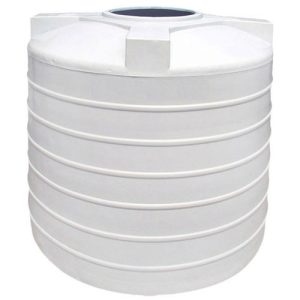
PVC Tanks
A PVC water tank is a storage container made from polyvinyl chloride, a type of plastic. It’s a strong and durable material that is resistant to UV light, making it ideal for storing water. PVC tanks are also very lightweight, making them easy to transport and install. It’s also more inexpensive than others, making PVC water tanks a more affordable option.
However, there are a few disadvantages to PVC water tanks. One of these is that PVC can react with some chemicals. It’s very important to use only food-grade PVC for drinking water storage. Another potential downside of PVC is that it can become brittle over time. This is especially true in colder temperatures. As a result, it is important to inspect PVC tanks regularly for cracks or other damage. Finally, they may contain carcinogenic materials. This means it contains materials that are linked to causing cancer.
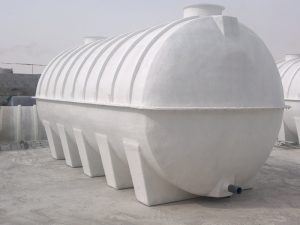
Fibreglass Tanks
Fibreglass is a popular material for water tanks because it is a durable option. They’re lightweight which makes them easy to install. They are also resistant to corrosion. Fibreglass won’t deteriorate over time like some other materials. They are also resistant to rust which can be a problem with other types of tanks. Finally, fibreglass tanks are also easier to clean compared to others.
However, there are some drawbacks to using fibreglass tanks. One issue is that the material is durable but not very strong, so the tanks can be easily damaged. Besides those, it’s not very heat-resistant, so the tank may not be suitable for use in hot climates. Fibreglass can also be more expensive than other types of tanks, and they may not be available in all areas.
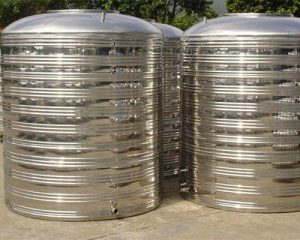
Stainless Steel Tanks
Stainless steel water tanks have several advantages over other types of tanks. They are strong and durable, and they resist corrosion. As a result, they can often last for many years with proper care. Stainless steel tanks are also easy to clean, which helps to keep your water supply safe and healthy. Besides those, they’re often less expensive than other types of tanks.
On the flip side, there are also some disadvantages to using stainless steel water tanks. For example, they can be more difficult to install than other types of tanks. This also means they may need special fittings. They can also be more difficult to repair if they become damaged. On top of that, they can be difficult to clean.

Concrete Tanks
On one hand, concrete is a very strong material, so it can withstand a lot of pressure. This means that your tank will be less likely to leak, even if it’s full. And, if you live in an area with a high water table, a concrete tank will be less likely to float out of the ground. Concrete is also a non-porous material, so it won’t absorb any of the water it holds. This means your water will stay clean and fresh.
On the other hand, they’re quite heavy, so they may be more difficult to install than other types of tanks. Additionally, they can be quite expensive, especially if you need a large tank. Finally, because concrete is non-porous, it doesn’t allow for oxygen exchange. This means that your water may stay fresh but not as aerated as it would be in a different type of tank.
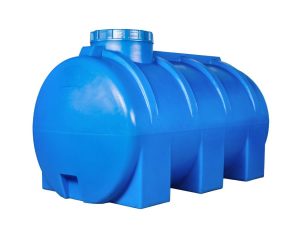
Polyethylene Tanks
Polyethylene is the most common type of plastic used to make water tanks. It’s a popular choice for both domestic and commercial water applications. It’s strong, lightweight, and durable, which makes it an ideal material for storing water. On the plus side, polyethylene tanks are very easy to install. They’re also another inexpensive option, making them a good choice for people on a budget.
However, there are a few things to consider before choosing a polyethylene water tank. Since polyethylene is also a plastic like PVC, it becomes brittle over time and may contain carcinogenic material in them. That means it’s important to check them regularly to avoid leaks. It’s also susceptible to ultraviolet light so storing them in a shady area is best. Exposure to sunlight over time can cause the material to degrade. This can make the tank less effective at storing water. On top of that, polyethylene is also a semi-permeable material. This means that it can allow small amounts of water vapor to escape. As a result, stored water may not be as fresh as it could be.
Installation and Maintenance of Rainwater Tanks in Foster
Proper installation and regular maintenance are key to ensuring the longevity and efficiency of your rainwater tank in Foster. Cessnock Tank Works provides professional installation services, ensuring your tank is set up correctly and safely.
Maintenance typically involves regularly checking for debris, cleaning the inlet and outlet, and ensuring the tank remains in good condition. Steel tanks are relatively low-maintenance, offering a hassle-free water storage solution for residents of Foster.
Cessnock Tank Works: Your Trusted Partner in Foster
Cessnock Tank Works is committed to providing reliable water storage solutions to the Foster community. With years of experience and a focus on customer satisfaction, we offer:
- Expert Advice: Our team can help you choose the perfect rainwater tank for your needs in Foster.
- Quality Products: We use premium BlueScope Steel to manufacture our durable and safe steel tanks.
- Professional Service: From consultation to installation, we provide a seamless and hassle-free experience for our Foster customers.
Solving Foster’s Water Storage Challenges
Rainwater tanks play a crucial role in addressing water storage challenges in Foster. They offer a sustainable solution by harvesting rainwater, reducing reliance on mains water, and helping to conserve this precious resource.
Investing in a quality steel rainwater tank from Cessnock Tank Works is a proactive step towards ensuring water security and peace of mind in Foster.
Secure Your Water Future in Foster: Contact Us Today!
Don’t let water storage problems disrupt your life in Foster. Take control of your water supply with a reliable steel rainwater tank from Cessnock Tank Works. Contact us today for a free, no-obligation quote and expert advice. Let us help you find the perfect solution to meet your needs and secure a sustainable water future for your home or business in Foster.









